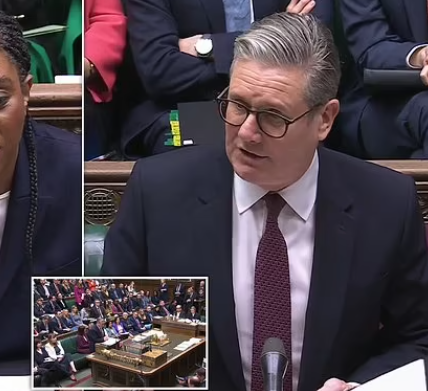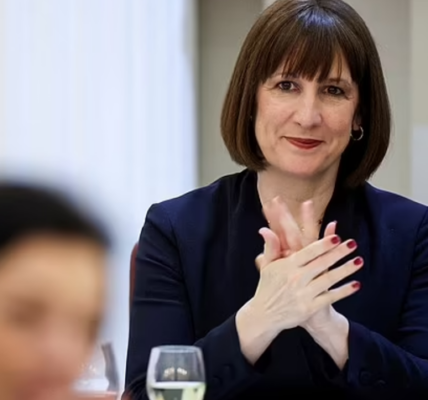
Chancellor Rachel Reeves is facing a Cabinet backlash over spending plans (Image: Getty)
Cabinet ministers demanding more cash in the Budget have been told to make savings instead.
Deputy Prime Minister Angela Rayner was one of three members of the top team asking for extra funding when spending settlements are finalised.
But No 10 said they should expect “tough conversations” following their plea for money and warned they will not be able to do everything they want.
The Prime Minister’s spokesman said: “I am obviously not going to get drawn into specifics of spending review discussions but clearly engagement between departments and the Treasury and No 10 ahead of the Budget and a spending review are clearly a standard part of the process where departments will set out their priorities and the challenges that they are facing.
“Not every department will be able to do everything they want to. There will be tough decisions taken, there will be tough conversations, but ultimately this Government has been very clear that it will fix the foundations, it will fix the position in relation to the public finances.”
In a sign of unrest at the top of government about the upcoming budget, some ministers wrote to Sir Keir Starmer about proposals to reduce their spending by as much as 20%.
Ms Rayner, who leads the Ministry of Housing, Communities and Local Government, Justice Secretary Shabana Mahmood and Transport Secretary Louise Haigh, have written letters raising concerns about the plans for their departments.
Education Secretary Bridget Phillipson did not deny there was a Cabinet backlash over the spending settlements for departments.
She said: “We’ve all had conversations, meetings, correspondence as part of the usual Budget process.
“I’m not going to get into a discussion about meetings or private conversations that we have both within Cabinet and as part of our Cabinet responsibilities, that wouldn’t be a responsible thing to do.
“As part of that process we as Cabinet ministers have conversations with the Treasury, with others, in order to get to a good settlement model. That’s absolutely as it should be, that’s all part of the normal way of doing things.”
Chancellor Rachel Reeves is believed to have largely finished the Budget but will continue finalising the details up until she delivers the statement on October 30.
Labour promised not to raise taxes on working people during the general election campaign.
Instead, it is looking at other measures to raise cash following claims of a £40 billion blackhole.
In the Chancellor’s sight is capital gains tax, with claims she could increase it on the sale of shares.
Ministers have refused to rule out asking employers to pay a larger amount in national insurance contributions.
Fuel duty, a tax which is included in the price motorists pay for petrol at the pump, could also be raised for the first time in more than a decade.
The tax on motor fuels was frozen by the Conservatives between 2010 and 2022, and was then cut by 5p to 52.95p per litre, where it currently remains.
It is a major source of revenue for the Government, and raising it could be an easy way to help meet Ms Reeves’ £40 billion target.
The Chancellor has also been looking at changing the fiscal rules the Government uses to constrain its own spending and tax decisions.
One option is to change the period over which the Government aims to see national debt falling as a percentage of the UK’s overall economic output.
Extending the five-year target or removing spending by certain public organisations from the total could allow the government to borrow more cash to invest in major infrastructure projects such as railways, roads, hospitals and new prisons.
The Institute for Public Policy Research think tank said that an increase in CGT in the fiscal statement will not stop entrepreneurs from investing in the UK.
It carried out interviews with millionaires on whether the change would led them to change their situation.
Investor Julia Davies said she had “never let tax rates dictate my decisions to fund innovation or pursue opportunities”, and Photobox founder Graham Hobson, who said the suggestion it would discourage investment was “simply a myth”.
But the Institute for Fiscal Studies said higher CGT rates would increase the incentive for people to leave the UK before realising gains to avoid paying higher rates. The tax is paid by around 350,000 people.
Shadow Commons leader Chris Philp warned Ms Reeves against raising national insurance contributions paid by employers.
He said: “Labour solemnly pledged in their manifesto that they would not raise national insurance. So raising employers NI would break that promise, it would hit working people, it would destroy jobs.
“This Government is driving businesses to close and making successful people leave the country. Their policies will destroy jobs and actually reduce the amount of tax collected so I ask them, sincerely, there’s time available yet in the next 13 days to stop and think again.
“And I appeal directly to Labour backbenchers, who the Prime Minister is more likely to listen to than me, please appeal to your Prime Minister, ask him to think again or his personal poll ratings – already minus 36% – are likely to plummet further.”



